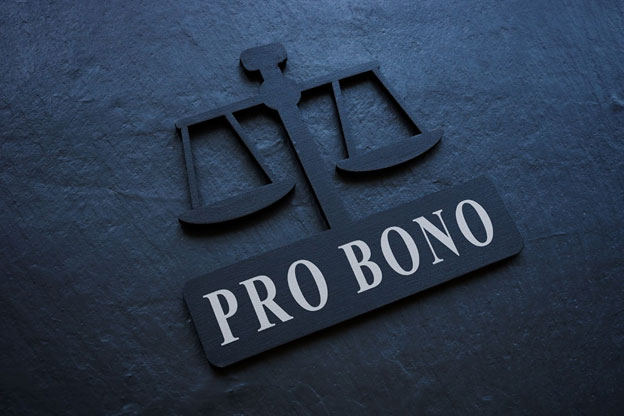This comprehensive article explores the significant role of pro bono services in the legal industry, underscoring the mutual benefits for both attorneys and communities. The piece delves into diverse aspects of pro bono work, including volunteering opportunities for lawyers through legal associations, NGOs, and private firms and the wide-ranging impacts of pro bono cases. Additionally, the article illustrates the extensive benefits of pro bono work for attorneys, which include professional development, personal fulfillment, and enhanced reputation. The discussion on the close-knit relationship between advocacy and pro bono work also highlights how these free legal services can drive systemic change and promote a more equitable legal landscape. This detailed exposition of pro bono services showcases their importance in legal representation and the broader legal ecosystem, providing an invaluable resource for law students, attorneys, and anyone interested in the impact and importance of volunteer legal work.

1. What are some of the volunteering opportunities available for attorneys who want to do pro bono work?
There are numerous opportunities for attorneys interested in pro bono work. These can be found through legal associations such as the National Association of Pro Bono Professionals (NAPBP) and the Pro Bono Institute (PBI), nonprofit organizations, law firms like Skadden, Arps, Slate, Meagher & Flom LLP and Latham & Watkins LLP, and digital platforms like ProBono.net and ABA Free Legal Answers. Additionally, many law schools offer pro bono programs to their students.2. How does pro bono work impact individuals and communities?
Pro bono services can significantly influence individuals by providing life-changing resolutions to their legal issues and empowering them with legal knowledge. On a community level, pro bono work aids in alleviating poverty and promoting social justice. By addressing legal issues like housing disputes, employment issues, and immigration status, pro bono work improves entire communities.3. How can pro bono work benefit attorneys?
Attorneys can greatly benefit from pro bono work in multiple ways. On a professional level, it offers practical experience, diverse skill acquisition, and network expansion. It can also provide a sense of purpose, contribute to work-life balance, and provide a platform for advocacy on a personal level. Regarding reputation and marketability, pro bono work enhances a firm’s reputation, attracts talent, and fosters client trust and goodwill.4. How is pro bono work connected to advocacy?
Pro bono services are instrumental in legal advocacy, especially for marginalized and underrepresented groups. Pro bono attorneys often engage in policy work, pushing for systemic changes to better serve their clients. They contribute to individual cases and work towards broader goals of systemic change, shaping a more equitable legal landscape.5. Can you provide examples of organizations that combine pro bono work and advocacy?
The National Law Center on Homelessness and Poverty and the American Civil Liberties Union (ACLU) are examples of organizations that combine pro bono work and advocacy. They work with a network of pro bono lawyers to provide direct representation while engaging in policy advocacy. They aim to protect the rights of marginalized groups and advocate for laws that improve their lives.As the global landscape continues to evolve, the role of pro bono services in the legal profession has become even more significant. Pro bono services – volunteer legal work performed free of charge or at a reduced cost – can provide meaningful support to individuals, nonprofits, and communities. This article explores the importance of pro bono services, the benefits for attorneys, and how this form of advocacy contributes to access to justice.
Pro Bono Services and Access to Justice
The world is increasingly complex, and legal issues are often a key part of that complexity. Many low-income individuals and communities lack affordable legal representation, exacerbating their plight. The American Bar Association reports that 86% of low-income individuals lack adequate legal counsel for their civil legal problems.The importance of pro bono services in this regard cannot be overstated. Volunteer legal work helps bridge this gap, providing legal aid to those who most need it. Pro bono lawyers step in where legal aid services may not be sufficient, offering their expertise and time to uphold fairness and justice.
Volunteering Opportunities for Attorneys
Given the increasing need for pro bono services, there are abundant volunteering opportunities for attorneys seeking to make a difference. These opportunities range from assisting individuals and families to nonprofit organizations and public interest groups. Many legal associations, NGOs, and even private firms offer volunteer lawyer programs that facilitate pro bono work in different areas of law.Legal Associations and NGOs
Organizations such as the National Association of Pro Bono Professionals (NAPBP) and the Pro Bono Institute (PBI) offer extensive resources and guidance to attorneys who wish to extend their services to those who can’t afford legal help. They connect lawyers with volunteer opportunities that align with their areas of expertise, from civil rights and immigration law to environmental and health law.For instance, the NAPBP supports various pro bono projects, such as the Disaster Legal Aid National VOAD Project. This initiative brings together volunteer attorneys to assist victims of natural disasters with legal issues such as housing, insurance claims, and FEMA appeals. Meanwhile, the PBI promotes pro bono service within law firms and corporate law departments and helps to match them with public interest and social justice initiatives.
Law Firms and Their Pro Bono Commitments
Many law firms recognize the importance of pro bono work and integrate it into their corporate culture. For example, Skadden, Arps, Slate, Meagher & Flom LLP is strongly committed to pro bono work, with their lawyers providing more than 200,000 hours of free legal services annually. The firm’s pro bono work spans a range of issues, including civil rights, asylum, education, and veteran affairs.Likewise, Latham & Watkins LLP is renowned for its pro bono program. The firm encourages all attorneys to undertake pro bono work and provides comprehensive support and resources to make these efforts successful. In 2022, the firm’s lawyers contributed over 220,000 pro bono hours to various causes, including environmental justice, asylum, and children’s rights.
Technology and Pro Bono Work
Advances in technology have also increased the accessibility and convenience of pro bono work. Platforms like ProBono.net and ABA Free Legal Answers are digital hubs connecting volunteer attorneys with clients in need. These platforms allow lawyers to select cases that suit their interests and expertise, contributing their time and skills flexibly and remotely.Furthermore, many law schools offer pro bono programs to their students, encouraging them to begin their legal careers with a service-oriented perspective. These programs provide practical legal experience while contributing to the community’s betterment.
Volunteering opportunities for attorneys are vast and varied, offering lawyers a chance to utilize their skills profoundly. These pro bono services provide invaluable assistance to those in need and enrich the professional and personal lives of the volunteering attorneys.
See Related Articles:
- How Much Should I Feature My Pro Bono Experience?
- How Pro Bono Can Help Your Job Search
- Why Attorneys Need to Get Out of the Office and Get Involved in the Legal Community
The Impact of Pro Bono Cases
Pro bono cases have substantial impacts that ripple across various levels of society. The effects of these cases can be seen in individuals, communities, legal precedents, and systemic changes in law. Here’s a deeper look into the transformative power of pro bono cases:Influence on Individuals:
- Life-changing Resolutions: For individuals, the most immediate and noticeable impact of pro bono cases is the resolution of their legal issues. With expert legal advice, they can navigate complex legal systems and achieve outcomes they would otherwise struggle to attain.
- Empowerment: Pro bono services empower individuals by educating them about their rights and helping them understand the law’s intricacies. This knowledge allows them to make informed decisions and protects them from potential exploitation.
Influence on Communities:
- Alleviating Poverty: Pro bono services often target low-income communities who struggle to afford legal representation. By addressing and resolving legal issues such as housing disputes, employment issues, or immigration status, pro bono work can contribute significantly to poverty alleviation.
- Promoting Social Justice: Pro bono services address systemic social issues such as discrimination, gender inequality, and environmental harm. Attorneys volunteering their expertise in these fields help communities achieve social justice and equity.
Influence on Legal Precedents:
- Setting Precedents: Pro bono cases often tackle unique or complex legal issues, setting new precedents that influence future cases. An example is the asylum case that Arnold & Porter Kaye Scholer LLP handled, which has since been referenced in many similar cases.
- Shaping Legal Landscape: In representing their clients, pro bono lawyers can challenge existing laws, pushing for amendments and reforms that bring about significant shifts in the legal landscape.
Influence on Systemic Changes in Law:
- Policy Advocacy: Many pro bono lawyers advocate, working with legislators and policymakers to effect law and public policy changes. These changes can have far-reaching impacts, improving access to justice for marginalized communities.
- Promotion of Access to Justice: Pro bono cases often spotlight issues in the legal system, such as lack of representation for low-income individuals, leading to discussions and actions aimed at systemic reform.
Pro Bono Contributions and Community Enhancement
Pro bono services offer more than individual case resolution; they enhance the community. By providing free legal services, pro bono lawyers help resolve issues affecting entire communities, such as housing discrimination, environmental problems, and education rights.Moreover, pro bono legal work has a tangible impact on poverty alleviation. Legal problems often stem from or exacerbate poverty, and attorneys contribute to wider societal change by helping to resolve these issues.
Pro Bono Work Benefits for Attorneys
While it’s clear that pro bono work greatly benefits those in need, it’s also crucial to recognize the many advantages it offers attorneys. These benefits range from professional growth and skill development to personal fulfillment and improved reputation:Professional Growth and Skill Development:
- Practical Experience: For young attorneys and law students, pro bono work provides invaluable real-world experience. Handling real cases allows them to apply their theoretical knowledge, enhancing their understanding of law in practice.
- Diverse Skill Acquisition: Pro bono work often involves various legal issues, allowing attorneys to gain exposure to different areas of law. This broad experience can develop versatile skills and contribute to a well-rounded legal career.
- Network Expansion: Working on pro bono projects can expose attorneys to a diverse network of legal professionals, NGOs, and potential clients. These connections can be instrumental in future career opportunities and collaborations.
Personal Fulfillment and Well-being:
Lorraine D’Alessio’s journey, described in From Fashion Runways to Legal Prowess, also reflects how passion and purpose can drive both professional and personal impact.- Sense of Purpose: Offering legal aid to those who can’t afford it can instill a profound sense of purpose and personal satisfaction. This feeling can increase job satisfaction and motivation.
- Work-life Balance: Many attorneys find pro bono work rewarding and meaningful, which can contribute to a healthier work-life balance and reduce burnout.
- Advocacy: For lawyers passionate about certain issues (like environmental protection, civil rights, etc.), pro bono work provides a platform to advocate for the causes they believe in.
Reputation and Marketability:
- Firm Reputation: Law firms that actively engage in pro bono work demonstrate their commitment to social responsibility, enhancing their reputation in the legal community and society.
- Attracting Talent: According to a survey by Vault/MCCA, most law students consider a firm’s commitment to pro bono work when deciding where to work. Thus, a robust pro bono program can make a firm more attractive to high-quality recruits.
- Client Relations: Pro bono work often enhances a firm’s public image, fostering trust and goodwill among potential clients. This positive perception can increase the client base and stronger client relationships.
Advocacy and Pro Bono Work
Pro bono services are instrumental in legal advocacy, particularly for marginalized and underrepresented groups. In addition to providing free legal representation, pro bono attorneys often engage in policy work, pushing for systemic change to better serve their clients.For instance, the National Law Center on Homelessness and Poverty, significantly aided by pro bono contributions from partner firms, provides direct representation while engaging in policy advocacy. They work tirelessly to protect the rights of homeless individuals and families and advocate for laws that prevent and end homelessness across the nation.
The American Civil Liberties Union (ACLU) also works with a robust network of pro bono lawyers to advocate for civil liberties and civil rights. They engage in litigation, communication, and public education to affect policy change on a national scale. The organization has spearheaded numerous landmark cases related to immigration, voting rights, and LGBTQ+ rights.
Therefore, it’s evident that pro bono work and advocacy are closely intertwined. When attorneys offer their services pro bono, they contribute to individual cases and work towards the broader goal of systemic change. This advocacy commitment underscores pro bono work’s integral role in shaping a more equitable legal landscape.
The Future of Pro Bono: A Commitment to Justice
As we look to the future, the importance of pro bono work will only grow. It’s a fundamental way to ensure that everyone, regardless of their income, has access to legal representation. In an era where justice often comes with a high price tag, pro bono services offer a crucial counterbalance, a beacon of hope for those who otherwise could not afford it.In conclusion, every attorney should consider engaging in volunteer legal work. The benefits are manifold, the impact profound, and the need is greater than ever. Let’s remember that at the heart of the legal profession is a deep commitment to justice - a commitment that pro bono work continually serves to uphold. Finding purpose in your career aligns perfectly with BCG’s mission to empower attorneys—see 21 Reasons You Made the Smartest Choice Choosing BCG Attorney Search.




